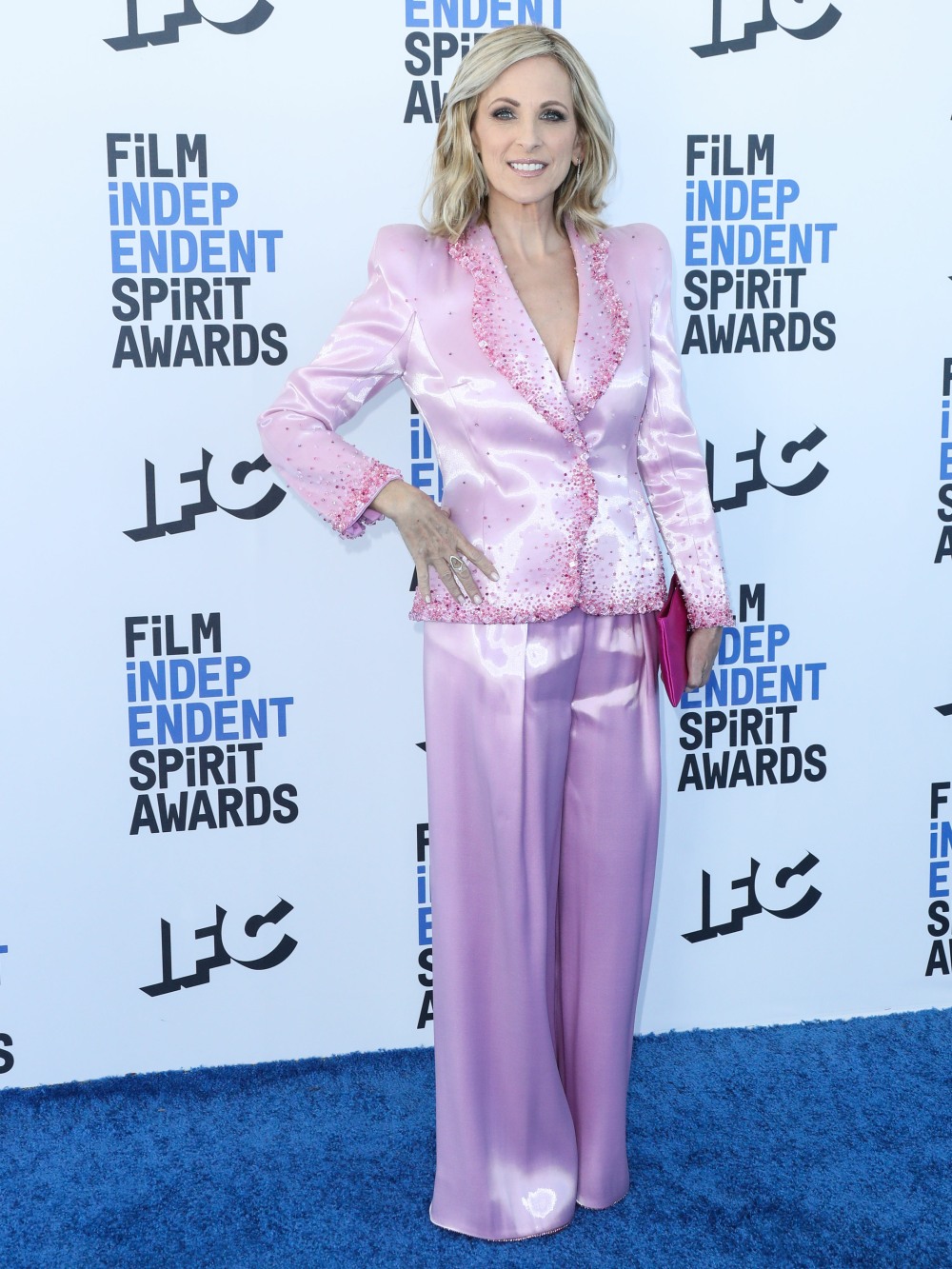One of the coolest parts about being in the film business must be the invitations to appear on various film festivals’ juries. You get to show up, wear great clothes, watch exciting and often emerging filmmakers, and you get invited to all of the cool parties. For Oscar-winner Marlee Matlin, she must have been so thrilled to get the call to be a jury member for the Sundance Film Festival. CODA got its start at Sundance (Apple bought it there in Utah) and it went all the way to the Oscars. So it f–king sucks that the film festival didn’t ensure that all of the films had closed-captions. Not just for Marlee, but all of the hearing-impaired people who wanted to watch and support independent films. Apparently, Marlee and the other Sundance jury members walked out of a screening when they realized the film wasn’t closed-caption accessible.
Jurors for Sundance’s U.S. Dramatic Competition walked out of the premiere of “Magazine Dreams” on Friday night over an incident in which the festival failed to provide adequate captioning for deaf and hearing impaired audience members — including juror Marlee Matlin.
Members of the dramatic jury — consisting of Jeremy O. Harris, Eliza Hittman and Matlin — decided to collectively walk out of the film as it began after a caption device provided to Matlin didn’t work. While the device was repaired hours later, it underscored a larger issue that has played out behind the scenes regarding the festival’s ability to make movies accessible to all viewers. The festival said the jurors intend to screen the film as a group before Sundance ends.
According to multiple sources, the jury has repeatedly expressed concerns to both Sundance and filmmakers that movies playing at this year’s festival should come with open captions. At other international festivals, including Cannes and Venice, movies are captioned in multiple languages on the screen. This year’s application for credentials to Sundance asked attendees if they needed access to captioning.
However, multiple sources state that several filmmakers have declined the request to provide open captions onscreen, citing the costs and time associated with making another print. Sources say that some buyers even suggested that including captions onscreen could somehow hurt the film’s asking prices on the market as they try to land distribution.
“Sources say that some buyers even suggested that including captions onscreen could somehow hurt the film’s asking prices on the market as they try to land distribution” – I’m sorry, what? Why would captions hurt the chance of a sale or distribution? For God’s sake, that doesn’t make any sense. It’s just being nasty to hearing impaired people for the hell of it.
Variety goes on to say that the Sundance Jury sent a letter to all festival filmmakers to “allow open caption DCP” to screen. Variety also points out that Sundance has actually been good on accessibility issues in years past, including ASL interpreters on stage and making certain locations wheelchair accessible (which isn’t a flex, that’s actually the ADA law). Sundance and ALL film festivals need to do a much better job of this. I realize that some films are only completed at the last minute, right before a festival, but f–king try harder with the closed-captions.
Photos courtesy of Getty, Avalon Red.
- Marlee Matlin arrives on the red carpet of The 93rd Oscars® at Union Station in Los Angeles, CA on Sunday, April 25, 2021.,Image: 607897099, License: Rights-managed, Restrictions: ©A.M.P.A.S. All rights reserved., Model Release: no, Credit line: sb / Avalon
- Marlee Matlin arrives on the red carpet of The 93rd Oscars® at Union Station in Los Angeles, CA on Sunday, April 25, 2021.,Image: 607897101, License: Rights-managed, Restrictions: ©A.M.P.A.S. All rights reserved., Model Release: no, Credit line: sb / Avalon
- SANTA MONICA, LOS ANGELES, CALIFORNIA, USA – MARCH 06: Marlee Matlin wearing a pink Armani Prive suit arrives at the 2022 Film Independent Spirit Awards held at the Santa Monica Beach on March 6, 2022 in Santa Monica, Los Angeles, California, United States.,Image: 666711303, License: Rights-managed, Restrictions: , Model Release: no, Pictured: Marlee Matlin, Credit line: Xavier Collin / Image Press Agency / Avalon















That’s so f up specially because they invited a juror that has that particular impediment… how is she supposed to judge the films? It’s ridiculous and so offensive!
exactly! what the what?!
also I can’t imagine that having captions available would be negative in any way. it’s an added feature! I use captions so much at home. for some things I keep them on and even when I don’t, I like to be able to wind back and see what they said. that’s absurd.
A huge failure for them. What a mess! Also super disrespectful to Marlee.
While this is 2000% an egregious c*CK up and a huge insult to the hearing impaired community, it also just …. doesn’t make sense from a financial standpoint. If I knew that one of the people between me and my film being able to slap a “Sundance Prize Winner” sticker on my ads was hard of hearing or hearing impaired, I would do everything and anything to accommodate them. Subtitles, Ms Matlin? Which font would you prefer? Can I get you another diet coke, Ms Matlin? Oh, your chair is not comfy? BURN THOSE CHAIRS!
Like, it’s just good business sense, keep your judges “happy”. And this isn’t happy, this is bare minimum “allow them to watch and understand the film”.
No kidding hey? CC is the bare minimum. How offensive.
Terrible look for Sundance. Get the captions or don’t bother having a festival.
It is a terrible look for Sundance – “caption device provided to Matlin didn’t work.” Just watched 1991 ‘Paris Is Burning’ DVD rented from Netflix and I could turn on subtitles with ancient player remote.
It feels like such a basic thing to provide and the reasoning of affecting asking price makes no sense since they’re required – at least in the US – for movies that are distributed in theaters or even streamed.
I suffer from chronic autoimmune disease which means Tinnitus is ALWAYS an issue & in the last 2 years I’ve had to lean MORE on closed captioning as I’ve learned to deal with my “new normal” & I was SURPRISED to find out that a LOT of movies on PRIME streaming services don’t have closed captioning…while EVERY movie I’ve looked at on the free streaming service…”Tubi” does….
It’s definitely not a question of money. There are plenty of transcription services that could provide adequate closed captions and subtitles, especially for a film of…at most…3 hours. If it’s constructively expensive, maybe their film is too long. Cut some scenes.
But these filmmakers just don’t care. There’s no excuse when Youtube can provide CC for many of their top performing videos.
Tubi is awesome! This makes me like them even more. The unsung heroes of the streaming era.
How do you invite a hearing impaired judge without cc? I use cc for everything and if it’s skipped, I skip the show. My husband is partially deaf and I have tinnitus so they’re mostly necessarily. People also don’t speak well, and I’m action movies it’s the low growl thing and I love action. Anyone not wanting cc should be disqualified.
Yes… when there’s loud music or back ground noise and the actors are mumble talking. I’m always the one saying “what did they say”. CC is very useful.
I accidentally had subtitles on for a movie once and now I can’t go back. I would love subtitles on everything. Having cc would not lessen a movie experience for me, so it’s dumb not to include it for people who actually need it.
I can hear, and I use CC subtitles on everything I watch. I never realized how much I missed until I turned them on.
“..multiple sources state that several filmmakers have declined the request to provide open captions onscreen..”
Request?! So make it a REQUIREMENT of participation, and pull films that don’t meet the requirement. Problem solved. You’re welcome.
They need to name the seven filmmakers that declined to provide open captions because that is straight BS.
Exactly. Sundance dropped the ball big time.
I’m guessing none or very few of the films provided audio description for jurists or audience members with visual impairments as well.
I’m not an English speaking person and in my country in the cinema we always get movies with subtitles, so here this wouldn’t be an issue, and it’s also probably why it’s never been an issue in Venice and Cannes.
But for years we were told that Americans (not sure about the Brits) loathe subtitles. That they pull them away from the film because they are a distraction. So I guess this is just a continuation of this issue. Now, as said, I’m used to them so they are not a distraction to me (or indeed most of the world), so I’m sure those who find them annoying would learn to use or ignore them pretty fast. When subtitles or close captions can be annoying, is when they differ a lot from the sound (I’ve seen English films where the person is saying one thing but the subtitle says something similar, but not the same (so same meaning, different wording) – that can be a really weird experience, it boggles your brain a bit).
ETA: As an example: Jim Jarmusch’s film Night on Earth apparently had problems with distribution in the 90s because he refused to dub the foreign languages and wanted to use subtitles instead. Subtitles were blamed for this. That’s where I first learnt that in the USA subtitles are a no-no.
Anyway, I hope Sundance fixes this issue.
This is ridiculous! Don’t get me started on the nonsense arguments. At least her fellow judges walked out with her but that’s setting the bar low. How do the distributors and the festival organisers think this is acceptable?
I don’t currently have any hearing issues that really impact me but one thing I have noticed with streaming services is an increasing number of English language films where characters will speak in another language for a few lines and there is no subtitling. You have to stop the film, go into the settings, turn subtitles on, watch that bit, then stop them if you want them off for the rest of the film. In the past subtitles would appear for the other language then stop.
I’ll leave my rant about the variable volume between super quiet dialogue then blaring music/action sequences for another day.
This is a very bad look for sundance but I’m glad that its happening because hopefully it furthers the conversation about access at places like movie theaters for deaf and hard of hearing people. Places are really resistant to adding captions and it should just be a normal part of something like a film festival like this.
i’m assuming the line about accessibility is referencing historical buildings, because any modern building should be ADA accessible as it is.
I’m so glad Marlee is highlighting this issue, though I’m sorry she was put into a situation where she needed to. Hopefully it will lead to greater accessibility for film festivals throughout the US going forward. My husband is blind and probably 4 out of 5 times the headsets for audio description at the movies are broken. It’s better at most (non Broadway) live theater venues but certainly not perfect. One thing that exists now and may help going forward is an app on one’s phone where you can access the descriptions via your own headphones. That technology should be easy for many festivals and theaters to incorporate and there might be something similar for closed captioning also. I’m guessing that Sundance might not have a dedicated accessibility coordinator, but hopefully they will have one going forward. It’s surprising they didn’t think of that with Marlee being on the jury this year. I’ve noticed a lot of regional theaters and streaming services being much better about accessibility in recent years but I guess that hasn’t yet carried over to the festival circuit. I myself am a professional audio describer (formerly for television and now for live theater) and I think I might want to contact Sundance to find out how they provide access to their patrons with visual impairments.
you should do it, Brailer! what a great line of work. (pus name checks out, haha!)
Thanks, SomeChick! (Such a cute name as well!)
My goodness Hollywood, be better.
See, this is just extra stupid because the history of innovation tells us that designing for disability creates better designs for everyone. From SMS to accessible doors and crosswalks, to kneeling transit; we all benefit when it’s easier to read, open, or board everyday inventions. And you know what’s incredibly common nowadays? Subtitles! My students are mostly under 25 and they use subtitles on everything they watch, partly because they are ESL learners, but also because it’s just commonplace. Do better, Sundance!
In the last few years there’ve been polls and articles about how young people prefer to watch shows with the closed-captioning on. So, I don’t think the distribution argument stands.
My eight year old grandson does not have any hearing issues (other than the typical can’t hear when he’s told to do something lol), but he ALWAYS turns on the CC when he watches TV, because sometimes it’s just hard to hear what they’re saying if there’s loud background noise, and it’s a great way to learn how to pronounce words (he wants to practice reading what he’s hearing).
I’m sorry, why is this an issue? I watch everything with captions these days, even in English. And I’ve been doing this for years and I’m not deaf or hearing impaired. It’s one of the reasons I don’t like going to movie theaters. Sometimes the acoustics are terrible, sometimes it’s a movie with actors who have accents that are hard to understand. Captions aren’t just for people who are hearing impaired. There’s no way I could have enjoyed Derry Girls as I did without the captions! I tried and only caught about maybe 80% of what the actors were saying. Sundance needs to catch up on accessibility as do all film festivals who refuse to provide closed captioning.
As someone who works in support staff, part of the issue is that accessibility requirements are rising, but without any increases in budget or deadline flexibility to make it happen. People seem to think that this all just happens magically, but it doesn’t. It takes time, skilled people, and the money to pay them for their work.
If Sundance is serious about captioning, they are going to have to require it and refuse to show films without it. Filmmakers are often working on the film until the last moment, which doesn’t allow the time to create a captioned print. And at this level auto-captions won’t cut it. You are creating the film experience for a certain portion of your audience. The work needs to be done, proofread and the approved by the creative team. And that’s before the new print is created. Sundance will also need to create some sort of grant program for lower budget films to caption.
Yes, things need to be made accessible, but the people doing that work must be paid for it.
Thank you for posting this! I also work in this area and a lot of people don’t appreciate that it’s a genuinely complex issue. That’s not to say accessibility isn’t essential, just that some of the issues aren’t just lazy people making excuses.
Also, this article (and many here it seems) are mixing up ‘open captions’ and ‘closed captions’ in cinema.
OC is on screen for everyone and unlike subtitles on foreign films it covers everything. I genuinely have some sympathy for filmmakers who feel that OC interferes with the immersive cinema experience. They don’t want “door slams” “sad music plays” “bird chirps loudly” up on the screen, especially for what is probably a world premiere, and they don’t like the timing/synchronicity problems that it often creates in the viewing experience. It’s also costly and time consuming for low budget movies that probably haven’t got a distribution deal yet and possibly only finished editing a week ago.
This however is separate from what seems to have happened with Marlee. There’s no excuse for that so I’m glad they walked out. It seems like Sundance set up a CC system (something like Captiview, which is a small personal screen that transmits captions) and it failed. That shouldn’t happen.
Ideally every festival would screen everything twice at least, once with OC and once without captions but that isn’t going to happen because it would hugely increase costs in an industry that, beyond the top tier blockbuster, is actually struggling.
@Concern Fae – the ADA hasn’t changed, requirements are not rising – but these days more people ARE taking legal action when requirements aren’t met.
Of course filmmakers are working up to the last minute, but they have to start planning for accessibility from the start, not just tacking it on at the end. (Which BTW is a much cheaper approach.) That’s how it works in the online world.
“However, multiple sources state that several filmmakers have declined the request to provide open captions onscreen, citing the costs and time associated with making another print.”
Accessibility shouldn’t be treated as optional depending on how easily it is achieved or what the cost is. It frustrates me to no end how so many people view accessibility as a nice bonus and not an absolute necessity for many people to move about the world in an equitable way. If the filmmakers refused, they should’ve not made it into the festival.
Fun fact! The fix for this is extremely simple* which makes it even more egregious that they’re not providing captions. Temporary proceniums in the screening rooms and projecting super titles on them simultaneous with the film. Super titles are super common in opera and not mysterious knowledge.
*it’s simple, but it would add on extra labor costs and the costs of additional projectors, but saves the cost of additional prints/copies of the film and more accessible than individual devices.
Aren’t there laws around accessibility accommodations?
@Eowyn – CORRECT – the ADA became law in 1990, and Utah is in America, and it’s not like this was a private party in somebody’s living room.
It's the equivalent of putting a bouncer outside the venue taking away everyone's eyeglasses – yes EYEGLASSES – and hearing aids and mobility aids.
Shame on them. There's no excuse.
(Rant over. Oh, this s**t makes me mad.)